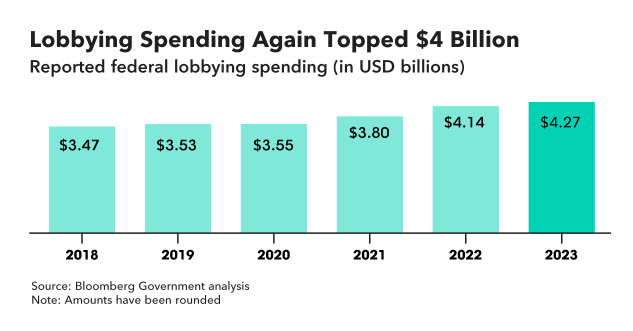- Implementation of 2022 tax and health law drove some lobbying
- Tax provisions expiring in 2025 could again bolster spending
Despite few new bills becoming law in the chaotic Congress of 2023, the full-time influence industry had another record year as lawmakers started laying the groundwork for future measures on taxation and artificial intelligence.
Disclosures required by law showed $4.27 billion in spending last year, up from $4.14 billion, according to a Bloomberg Government analysis.
That 3.1% increase — just short of the 3.4% increase in the Consumer Price Index — was posted as the pace of routine legislative activity slowed and both lawmakers and advocates started looking ahead to the next big things, such as the looming expiration of major provisions of the 2017 Tax Cuts and Jobs Act.
FULL COVERAGE OF THE LATEST BGOV LOBBYING REPORT
Unless Congress acts, individual income tax rates will revert to their 2017 levels; the standard deduction will be cut roughly in half; the personal exemption will return while the child tax credit will be cut; and the special 20% tax deduction for many pass-through businesses will disappear, according to the nonpartisan Tax Policy Center.
That will put tremendous pressure on Congress to do a major tax bill in 2025, no matter who is in control of the White House, House and Senate.
“One of my colleagues described it as taxmageddon,” said Erik Olson, president of Venn Strategies. “We will see if that’s really the right way to describe it, but we’re certainly heading down that path.”
Todd Wooten, a partner at Holland & Knight, described the 2025 sunsets in sports terms, saying the Super Bowl of tax legislation spurred corporations with a stake in the outcome into starting early to build relationships with leaders of the tax-writing House Ways and Means Committee and Senate Finance Committee.
“The smart people are the ones who are engaging now,” Wooten said.
Karishma Shah Page, a partner at K&L Gates and member of the firm’s public policy and law practice, said the farm bill also helped drive lobbying spending in 2023. Congress opted for a one-year extension rather than a full reauthorization of the multi-faceted policy measure that covers agriculture policy and food assistance programs.
“In many ways, what we’re seeing is that stakeholders really feel as though they need to be proactive and prepared on an ongoing basis,” Page said. “If and when the train is coming, they’re there on the platform with the ticket with a bag packed and ready to go, even if there’s no schedule for when the train’s going to arrive or depart.”
“It’s just simply too late by the time they’re ready to pass something,” she said. “At that point it’s been litigated so many times, you’ve missed the opportunity to be part of it.”
And shaping legislation can be only a first step for companies affected by federal decision-making. Executive branch agencies in charge of implementing new laws seek input as they write regulations that determine how those laws will work in practice.
Lobbyists interviewed said their clients had a lot of interest in the decisions health and energy agencies made in carrying out sweeping mandates of the Democrats’ 2022 tax, health and climate law Act (Public Law 117-169).
For example, the law gave the Medicare program new power to negotiate some drug prices, leaving it to federal officials to work out many of the details for that process. Pharmaceutical companies including Pfizer, Merck, Novartis and Genentech hired lobbyists in 2023 to help them make their arguments to federal officials during this process.
Tech firms including Texas Instruments and TSMCand Nvidia and Samsung hired lobbyists to represent them in discussions about carrying out the mandates of a law intended to beef up the domestic semiconductor industry, the CHIPS and Science Act (Public Law 117-167).
“You go down the list and there was a lot going on there,” Steve Elmendorf, a longtime lobbyist and a co-founder and managing partner at Avoq, said of 2022 legislation that was in the regulatory pipeline during 2023.
Some of the tech firms also hired lobbyists last year to represent them as Congress started considering options for legislation on artificial intelligence (AI), a process that has continued in 2024 with hearings by the House Energy and Commerce Committee and the Senate Finance and Judiciary committees.
“It is difficult sometimes to figure out where all this is going,” Wooten said. “But it is happening. Things are absolutely taking shape.”
To contact the editors responsible for this story:

